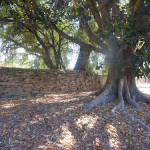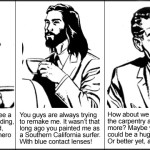We run our website the way we wished the whole internet worked: we provide high quality original content with no ads. We are funded solely by your direct support. Please consider supporting this project.
Why Did Jesus Curse The Poor Fig Tree?
Why Did Jesus Curse The Fig Tree?
One of the strangest episodes recorded in the Gospels is Jesus cursing a fig tree because he was hungry and it didn’t have any figs (Mk 11:12-14; Mt 21:18-19). It’s the only destructive miracle found in the New Testament. What’s particularly puzzling is that Mark tells us the reason the fig tree had no figs was because it wasn’t the season for figs.
On the surface, it might look as if Jesus simply lost his temper and used his supernatural power to punish a poor tree whose only crime was being in the wrong place during the wrong season. Most commentators argue that the fig tree represented Israel and Jesus was symbolically warning that judgment was coming if it didn’t start bearing fruit. This is probably correct, but I don’t think it addresses the most profound significance of this event. If we understand this episode against the background of the apocalyptic thought of Jesus’ day, we can discern another layer of meaning.
Famine was widely believed to be the work of the devil in apocalyptic thought, and barren or infected fig trees became symbols of this fact (Mk 13:8; Rom. 8:35). What is more, many Jews of this time believed the Messiah would free nature from Satan’s grip, thus putting an end to things like famines. When we interpret Jesus’ cursing of the fig tree in this light, it seems evident he was proclaiming that he was the Messiah by “cursing the curse.” And in doing so, he symbolized that he was the long awaited one who would “destroy the devil’s work” (I Jn 3:8) and restore creation.
More generally, Jesus was thus demonstrating that, where God reigns, the demonic corruption of nature will be in the process of being overcome. And he was showing that, when the Kingdom is fully manifested, the whole cosmos will be delivered from the oppressive Powers. There will then be no more famine, droughts or hunger. Nature shall produce abundant vegetation and fruit, as it was always intended to do.
Something similar could be said of other “natural miracles” performed by Jesus. When Jesus miraculously fed the multitudes (Mk 6:30-44; 8:1-10) and brought about a miraculous catch of fish (Lk 5:3-10; cf. Jn 21:1-8), we can understand him to be enacting the truth that when the future Kingdom comes, humans will be reinstated in their proper place of authority, exercising dominion over nature. Consequently, there will no longer be any shortages of food.
So too, when Jesus raised people from the dead, and when he himself was raised from the dead, he was revolting against the reign of death and the one who holds the power of death (Heb. 2:14). And in doing this, he was pointing to a time when “the last enemy” would be utterly destroyed and death would be no more (I Cor. 15:26.)
So, Jesus cursing of the fig tree wasn’t the result of a temper tantrum. Jesus was cursing the curse and revealing himself to be the long awaited Messiah who would eventually free creation from the bondage of Satan.
Category: Q&A
Tags: Bible, Jesus, New Testament, Q&A
Topics: Enemy-Loving Non-Violence
Related Reading

Isn’t Open Theism outside of historic orthodoxy?
The Church has never used one’s view of divine foreknowledge as a test for orthodoxy. And while the open view has always been a very minor perspective, it has had its defenders throughout Church history and it has never been called “heresy” (until in mid 1990s when some started using this label). According to some…

Not the God You Were Expecting
Thomas Hawk via Compfight Micah J. Murray posted a reflection today titled The God Who Bleeds. In contrast to Mark Driscoll’s “Pride Fighter,” this God allowed himself to get beat up and killed while all his closest friends ran and hid and denied they even knew him. What kind of a God does this? The kind…

How do you respond to Genesis 25:23?
The Lord told Rebekah, “Two nations are in your womb, and two peoples born of you shall be divided; the one shall be stronger than the other, the elder shall serve the younger.” (cf. Rom. 9:12–16) Old Testament scholars agree that the author (and later, Paul in Romans 9) has the descendants of Jacob and…

The Bible is Infallible NOT Inerrant
While the cruciform understanding (explained here) of the “God-breathed” nature of Scripture is in tension with the way most talk about inerrancy (See previous post on inerrancy), I do not believe it is at all incompatible with what the Church has always sought to express by affirming the “infallibility” the Scripture. The core conviction is that Scripture will…

Why Did Jesus Curse the Fig Tree?
One of the strangest episodes recorded in the Gospels is Jesus cursing a fig tree because he was hungry and it didn’t have any figs (Mk 11:12-14; Mt 21:18-19). It’s the only destructive miracle found in the New Testament. What’s particularly puzzling is that Mark tells us the reason the fig tree had no figs…

